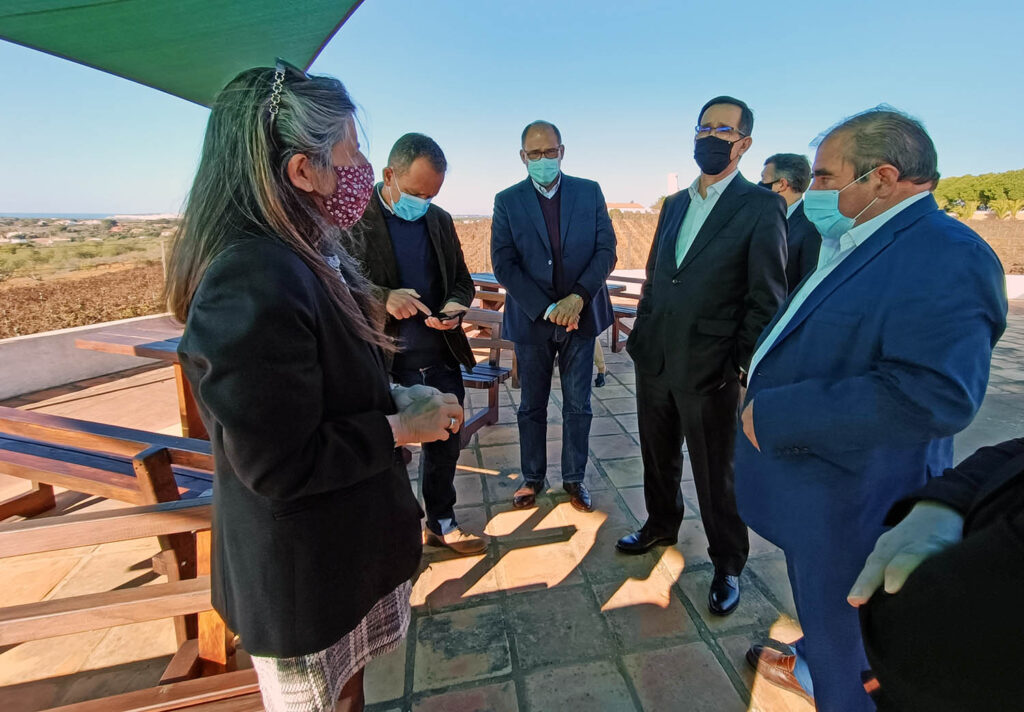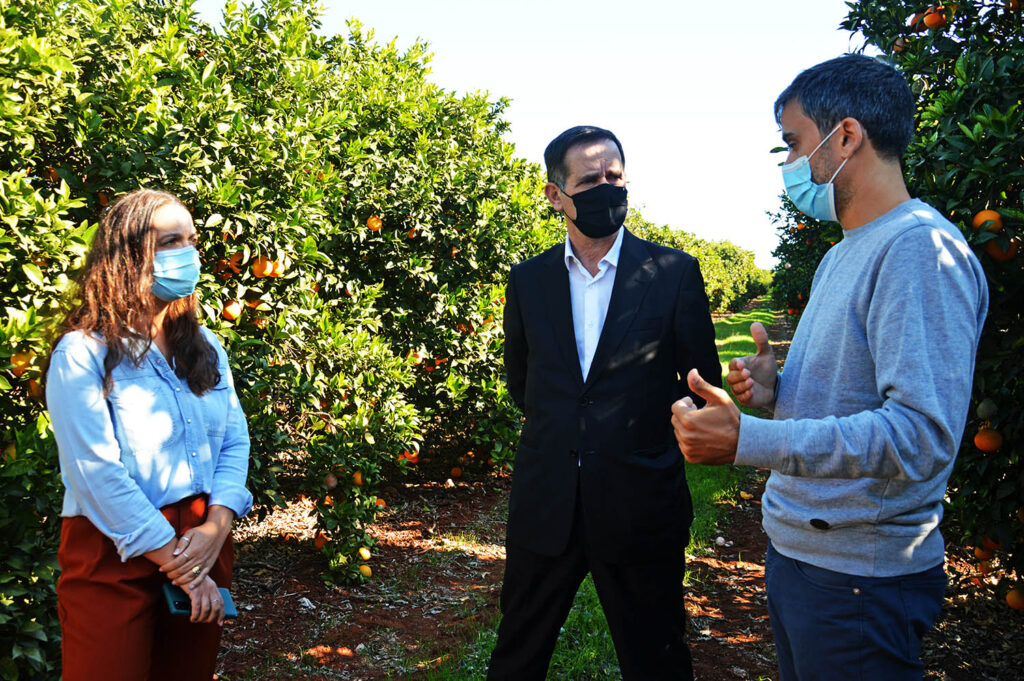The Secretary of State for Agriculture and Rural Development visited the Algarve on the 18th, to get to know some investments up close and meet with various entities. O Sul Informação, who accompanied the initial part of the visit, interviewed Rui Martinho mid-morning about the reasons for this visit.
During the morning, the Secretary of State visited the Adega do Cantor Sociedade de Vitivinicultura, Lda, in the municipality of Albufeira, and the orchard and the Frutas Tereso plant, in the Algoz (Silves) area. Also in the morning, already in Silves, he met with the Association of Irrigators and Beneficiaries of Silves, Lagoa and Portimão, as well as with directors of AlgarOrange, the Algarve's Citrus Operators Association.
In the afternoon, after a meeting with the Algarve Regional Directorate of Agriculture and Fisheries, at the headquarters of this body, the Secretary of State visited the Madrefruta Producers Organization, in Pechão (Olhão).
Sul Informação - What are the objectives of this visit to the Algarve?
Rui Martinho - It has two goals. On the one hand, knowing what is being done in each of the regions and, also, becoming aware of the problems that agricultural activity and economic operators are facing in their daily lives, and, particularly now, in the context of preparation of the Specific Plan for the Development of Portuguese Agriculture, find ways to find answers that allow solving or helping to solve these problems.
But the visit was also intended to highlight the extraordinary achievements in all regions of the country.
We are here in the Algarve today, but we will go to all regions of the country to get in touch with the reality of agriculture, with entrepreneurs, with farmers and with the problems they face.
Sul Informação: What are the main problems already identified?
Rui Martinho - There are problems that are common to all sectors, namely the entire Algarve region, such as the issue of water, water management, water availability, and efficient use of water. There are other problems, such as the drop in the availability of labor to carry out agricultural work.
We are now leaving Tereso Fruits and we are very focused on the problems affecting the orange sector, namely a set of pests that have a very high importance in production, namely the fruit fly, but also other more recent pests, such as the trioza.
We are making this contact with companies to understand, together with them, what can be done. We already knew that the problems existed, but this dialogue is important for us to assess, together, how we managed to organize ourselves and how we can respond to this problem.
The objective is to be able to join efforts between the central administration and the producers, counting on the financial support of the instruments that we are preparing.
SI -Then there will be a meeting with the association of watercourses. What is the agenda for this meeting?
RM - One of the biggest problems in the Algarve, as I mentioned, is the issue of water availability. The meeting will serve to see with them what can be done, what projects are underway, how the works are going, and also see how we can envision the continuation of this investment plan.
This is an ambitious investment plan, not only in the Algarve, but in the entire country, but which is absolutely crucial for the development of agricultural activity and for its competitiveness.
SI - It was A new support package was announced this week. which also has to do with works to improve existing irrigation networks, dams, etc. Here in the Algarve, are you going to talk about it too?
RM - Let's talk about all subjects. This package that was announced is not just about irrigation, this is just one component, nor is it the most significant.
We are talking about a set of measures to support investment in agricultural production, investment in processing and marketing, investment by young farmers and the installation of young farmers, in short…small investments.
It is much broader than the issue of irrigation. Irrigation is one of the warnings that is provided for in the scope of this very large package and which, obviously, will also apply here to the Algarve region. They will be potentially candidates for such investment support, which will be opened in the very short term.
SI - One of the problems with dams in the Algarve, and not only that, is that the water in the canals is carried out in the open, generating very large losses. Changing this system is one of the investments that irrigation associations have long said that it is necessary to make. Will this new package allow this conversion?
RM - It is one of the investments that has been supported and that will be the priority of our work in supporting irrigation: taking the existing irrigation and making it much more efficient. By making it more efficient, we are going to allow that, with less water, we can irrigate a larger surface and thus create more value associated with economic activity.
But this component of rehabilitation, modernization and improvement of efficiency in water use is the main objective, even more than the expansion of irrigation. What matters, in fact, is to make these investments that allow us to do more with less.

SI - With this package that was made available, will it be possible to move forward with these investments?
RM - One of the notices is precisely aimed at supporting the modernization and improvement of irrigation efficiency. In addition to the fact that here we have to take into account the issue of improving irrigation efficiency, which is at two levels: at the level of collective irrigation works, but also at the level of what each farm does with the water it has. .
And there are investments of a private nature and new irrigation systems, investments in monitoring the water consumed, namely the availability of water in the soil, and all of this is eligible, namely, in the notices that we are going to open, for investment in agricultural exploration. Therefore, we have to combine the two instruments in order to face a common goal: to make good use of water, which is scarce, thus managing to produce more than we have been doing so far, avoiding waste.
SI – The Algarve has always been a region where water is not abundant. However, we have seen a huge expansion of irrigated agriculture. Isn't that a nonsense? How do you manage to balance these two things?
RM - The evolution that we have been experiencing in terms of climate change makes it even more necessary to have irrigation, because it no longer corresponds to what was possible to do in a dryland a few years ago. As there is currently less availability of natural water, if there is no irrigation, even these traditional cultures will probably not be able to do in terms of competitiveness.
Therefore, we have to find ways to develop irrigation to have water available, so that we can continue to have the activity, namely, the traditional one. For example, the carob tree is a traditional culture in the Algarve that is very well adapted to this region. Who says the carob tree says the almond tree, but that was in a period when water was not as scarce as it is today. As today is much more scarce than in the past, probably even for these cultures we will have to find ways to, in certain periods when their water needs are more accentuated, give them a helping hand, so that they can prosper more easily than in the past. which unfortunately happens.
If that doesn't happen, these traditional areas will continue to be abandoned and that's bad for agricultural activity, but also for the preservation of resources and for other kinds of things, namely, the prevention of fires. We know that, when there are abandoned areas, the scourge of fires knocks on our doors very intensely.
SI - And in relation to small-scale family farming, is there any planned support?
RM - We have been modernizing and improving the status of family farming. We created a set of very relevant incentives for this type of agriculture. Be it at the level of a subsidy in the consumption of green diesel, or at the level of the insurance premium, which is subsidized, but also giving priority to access to all support schemes, namely support for investment in agricultural exploration.
But we have also created a specific line of credit for those who have family farming status, up to 5 euros, with a 50% rebate on the interest rate, to allow them access to credit and meet the need for working capital that has. Therefore, there is a set of measures that serve as instruments specifically aimed at this activity, with increases in support and priority in access to other regimes.
There is a complete set of support measures that aim to support small-scale farming and in particular family farming.
SI - This afternoon he will end his visit with a meeting with MadreFruta, who was one of the pioneers in this new wave of expansion of intensive agriculture, of greenhouses, in the Algarve. What will be discussed at this meeting?
RM - We do not take any matter to discuss with MadreFruta. Let's listen to each other, understand their experience, understand what is being done, understand what their difficulties are, and see, as we did here at Frutas Tereso and in the morning at Adega do Cantor, to see what the issues are, what they are the problems that arise and find ways to help overcome the difficulties faced by these companies and the region's agriculture in general.
SI - One of the issues that will certainly be on the table at the meeting with MadreFruta is the manpower…
RM - No doubt. One of the problems that has been mentioned, in addition to water, is this issue that is common to all activities, labor. We have a labor shortage problem. We have to find ways to overcome it, namely, managing to accommodate some populations that have contributed decisively to maintaining the competitiveness of these production systems.
And we have to find ways to make the regions more attractive, also giving better living conditions to these people, so that they can settle here and stop being precarious, starting to be a permanent contribution to the region's activity, whether in agriculture , or in other economic activities.
Because the shortage of labor is not only found, unfortunately, in agriculture, in tourism it is also very much felt.
We're going to have to find ways to keep the best professionals we can find, giving them better living and working conditions.
And it is to this that, all together, whether the central administration, the local authorities, or the entrepreneurs themselves, will have to find ways to respond and thus enable the activation of the human resources they need.




















Comments